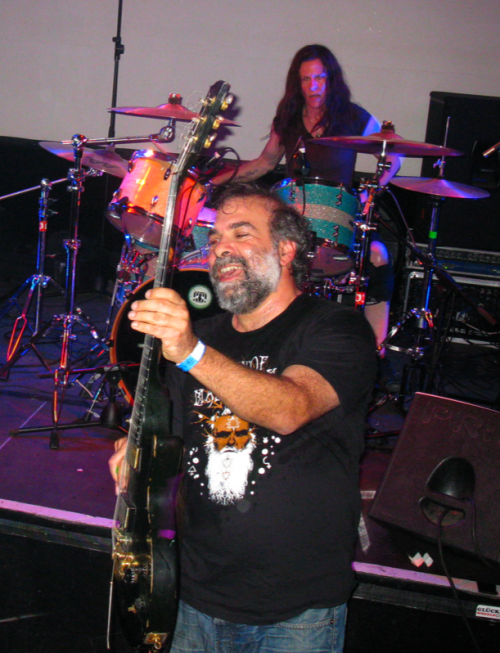by Caitlin Hardee
– Guest Columnist —
We were upstairs in the Berliner club Cassiopeia, and it was the last stop of a lengthy European tour for Stinking Lizaveta. The band lounged on torn beige vinyl sofas. Dim red light suffused the room and gleamed off disco balls suspended from industrial rafters. The club’s second dance floor was littered with luggage and instrument cases. The bar had been turned into artist reception, crammed with juice, chips, tea, a coffee machine and pieces of paper advising the Wi-Fi password.
 Guitarist Yanni plucked at a well-loved Gibson LP Studio, while crew member Mike coaxed a clear cascade of sweetly trembling notes from a mandolin. Yanni broke into song, his voice full and rich, with a low rough ache. The others joined in. Drummer Cheshire’s smooth tones lifted the melody. Yanni and Mike jammed their way through a bluesy warmup repertoire. Bassist Alexi slid in with a soulful growl now and then as he tapped away on his MacBook.
Guitarist Yanni plucked at a well-loved Gibson LP Studio, while crew member Mike coaxed a clear cascade of sweetly trembling notes from a mandolin. Yanni broke into song, his voice full and rich, with a low rough ache. The others joined in. Drummer Cheshire’s smooth tones lifted the melody. Yanni and Mike jammed their way through a bluesy warmup repertoire. Bassist Alexi slid in with a soulful growl now and then as he tapped away on his MacBook.
This tranquil singing session was particularly striking in comparison to what the band was about to do onstage. Stinking Lizaveta have made their name in the music world as a resolutely unique trio of heavy rock pioneers, playing an unrestrained, instrumental style for which they adopted the term “doom jazz.” Their studio and stage material consists of tracks which take the listener on a powerful, wordless journey through unknown space of musical frontiers, breaking all formulaic rock conventions. The band recently released a new album, 7th Direction, and had only good things to say about their European tour.
“This is the last show,” said Yanni. “[It’s been] fantastic, just exceeding our expectations at every turn. Touring Europe, everywhere you go it’s like a different fiefdom. The promoters take their jobs very seriously, are really into who they’re bringing to their town—a lot of the clubs we played in here, it’s not professional people running them, it’s volunteers. So these people are there doing sound, cleaning up, making food, doing the door, because they want to be a part of this thing, not because they just got a job doing it. In the States everything is very business-oriented. People get into music because they love it, but they’re not really going to go out of their way for you.”
The band modestly brushed off notions of their own innovative position in the rock avant garde, citing numerous influences and the tradition of instrumental rock.
“I think there’s a history for it in rock music, it’s not like we’re experimental,” said Alexi. “The Ventures didn’t have lyrics. There’s not a lot, but there’s rock music without vocalists that has existed. You just have to search it out a little more, because it’s not going to be the first thing you hear on the radio. The Meters have several hits that have no lyrics. A lot of bands had songs, that were on the radio in the 60s and 70s, that didn’t have lyrics.”
“Almost every rock band had the instrumental track on their record,” chimed in Yanni. “So a band like ours just says, ‘Well, why don’t we just do that? We’ll be a band that just does that, but does seven of them instead of one.’ It sets me free, definitely. Sometimes when you’re playing with a singer, you’re up there and you’re just kind of making the donuts, you know? Because the singer’s doing all the work, you just have to get through the next four measures while they’re delivering it. When you’re just playing music, you’re right up there, they’re listening to you, you’re responsible for everything that’s going on. It puts you center stage the whole time, which is challenging.”
This unconventional approach naturally has assured the band a smaller audience of niche appreciators, rather than a massive commercial following. The band offered nuanced reflections on the question of whether the choice to forgo vocals was a deliberate self-isolation from commercialism.
“I was never under the delusion that a band that I would ever be in would get mainstream radio play,” said Alexi. “I wouldn’t want to be in a pop music band. That’s not even an issue. College radio is different, you know, people on college radio will play anything.”
In a later Facebook post, the band further elucidated the question, asserting that the inherent nature of their music is a mandate rather than a choice, by default ruling out confirmation to safe commercial norms.
“Commercial music on the other hand must (or seems to think it must) exist with no questions, no demands,” wrote Stinking Liz. “Its success depends upon delivering tiny pieces of clearly defined information to what some record exec thinks is gonna be the most amount of people which means it operates on absolutes I mean right down to machine time, auto correct drums, pitch control and cut and paste guitar and its content cannot be anything but totally mentally smooth or unquestionably strong or unswervingly passionate or absolutely redeeming… and while it’s true that people seek clarity in art it’s also true that humans are not clear creatures. We are terrifyingly ambiguous and our ambiguity terrifies us; our ambiguous relationships to ourselves, each other and our environment terrify us . . . I think it’s balls out, risky and awesome and hilarious. When we’re on it’s commercial music isolating itself from us. Run screaming…”
The lengthy and heartfelt post was characteristic of the band’s unassuming style in relating to their fan base. Like many bands, Stinking Lizaveta has come to utilize the power of the Internet and social media in communicating directly with their listeners.

“You can look at the pages, they’re full of comments,” said Cheshire. “There’s the enthusiastic, just-got-back-from-the-Stinking-Liz-show burst of ‘Oh my god, you guys were awesome,’ and then there’s the couple days later, it’s like, ‘Oh yeah, looked you guys up again, this is cool.’”
“Yeah, it’s a good thing they designed the Internet specifically for bands,” laughed Yanni.
This openness goes beyond online discussion, to the organic relationship with the fans on tour.
“We see them in stinky clubs, drunk at the end of the night . . .” said Alexi.
“They open up their houses to us, it’s really always a good time,” added Yanni.
Any hard-working rock band on the road deals with sufficient challenges to begin with, but Stinking Lizaveta have faced an added complication in the past months, in the form of a nasty bicycle accident which shattered Cheshire’s leg.
“So this was a car-on-bike, I was riding a bike, and I didn’t really win the confrontation,” said Cheshire, wryly indicating her impressive scar. “He knocked me down and broke the horn of the tibia, so it got crushed down and they had to rebuild it with titanium and cadaver bone chips.”
Onstage, she thrashed the drum kit like she’d never heard of the word “injury,” but it’s been a long and trying recovery for the drummer. Cheshire underwent eight weeks being unable to bear weight on the injured leg, using a machine to slowly rebuild motion capacity. After that, she was on crutches and in extensive physical therapy to regain muscle mass, flexibility and strength. She elaborated on the dangers of urban commuting for bicyclists in a city like Philly.
“Philadelphia has a lot of bike lanes. The reason for that is, there’s federal money that they get for infrastructure, for roads—the stipulation is that there will also be bike lanes put in on these roads. But there’s always an argument,” said Cheshire. “There was recently a bridge, finally put in the South Street reconstruction, a bridge that was fought over for ten years in Philadelphia, to get pedestrian lanes and bike lanes. It connects Center City with bits of West Philadelphia, and it’s really important that bicycles and people be able to go over these bridges. But that gives you an idea—there’s contentious politics. Whenever a pedestrian gets bumped by a bicycle, it’s like rage, rage, rage. But pedestrians are killed by cars constantly—it’s a rare bicycle accident that kills a pedestrian.”
 Cheshire went on to reflect on the changing transit culture in the States.
Cheshire went on to reflect on the changing transit culture in the States.
“In the neighborhood where I live, the bicycle culture has just exploded, and the car culture just hasn’t gotten used to it yet. I mean, I was sitting at this guy’s two o’clock, he wanted to make a right-hand turn, he had to literally look through me to see where he was going—but that’s what he did. I think there’s a lot more density in the cities [in Europe], and these folks have found out, they have a lot of vested interest in having public transit. You can’t have everybody having a car in a city like Berlin. American cities are just not as dense—yet. We had the suburban revolution, and now, if we priced gas commensurate to its actual cost, we will find out that we cannot afford suburbs, we have to be Berlin at some point.”
For now though, the band will say farewell to Berlin and the tour, and head home—and off to new adventures. The members pondered what they had been missing the most from the States—and had to think for a few moments.
“You’re supposed to say your wife, man,” jibed Cheshire.
“Well, I’m going to meet [my family] over here,” Yanni replied smoothly. “I don’t know, it’s hard to compare Europe to the States. We’re Americans down to the core, but it’s really a different place over here.”
“I’ve missed riding my bike instead of sitting in a fucking van all day,” said Alexi decisively.
“I’m not allowed to ride a goddamn bike yet, and I miss that all the time, no matter where I am,” sighed Cheshire.
We’ll be wishing her all the best for her continued recovery, and congratulate the band on a successful tour.
Band:
Yanni Papadopoulos – Guitar
Alexi Papadopoulos – Upright Electric Bass
Cheshire Agusta – Drums
Online: http://www.stinkinglizaveta.com/



